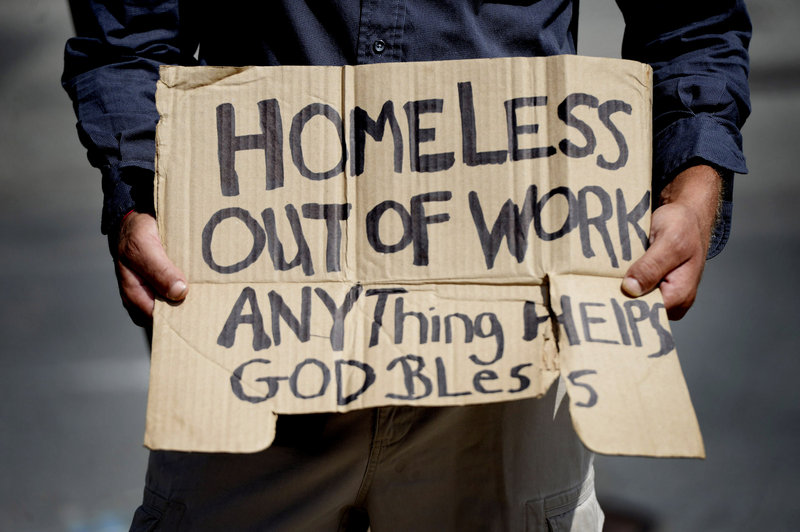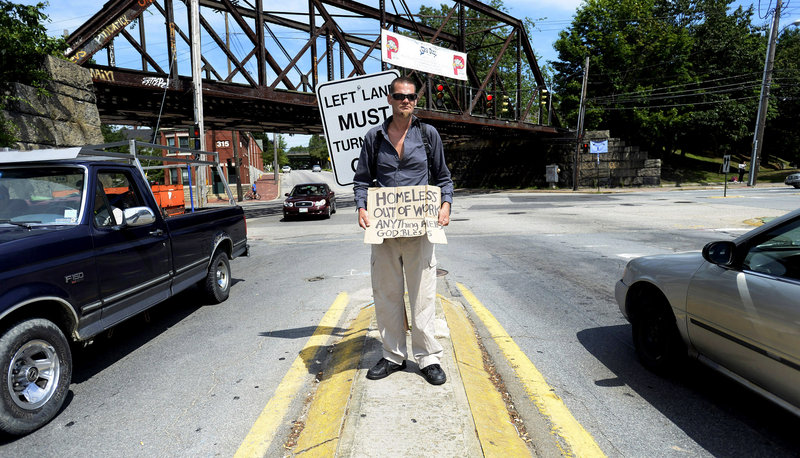PORTLAND – Shane Boilard spends a few hours a day, a few days each week, panhandling on the streets of Maine’s largest city, usually on traffic medians at major intersections leading into the downtown area.
Boilard, a former construction worker who is 37 and homeless, says he collects close to $10 a day from passing motorists. That’s enough to supplement $200 a month in food stamps, buy tobacco and rolling papers, and maybe take his girlfriend to the movies once in a while.
Boilard’s panhandling options will be significantly restricted beginning Aug. 15, when the city’s new ban on loitering in median strips is scheduled to take effect. The City Council unanimously approved the ban July 15, responding to a recent spike in panhandling at several high-traffic gateway intersections. The American Civil Liberties Union of Maine may fight the ban in court.
Supporters of the ban say it is needed to protect public safety — both for panhandlers and the traveling public.
But Boilard, who’s from the Berwick area, says the ban won’t stop him from panhandling and will do little to address the underlying issues that force him to beg on the streets, where he’s hassled by police, yelled at by motorists and generally embarrassed and degraded.
“I’ll just move up to Congress Street,” Boilard says, referring to the city’s main downtown thoroughfare.
Tall and lanky with a buzz cut and tattoos, Boilard stands on a median strip at the intersection of St. John Street and Park Avenue. He holds a creased cardboard sign: “Homeless, Out of Work, Anything Helps, God Bless.”
“You gotta make money to do things,” Boilard explains.
Boilard’s planned response to the median ban illustrates the larger challenge that Portland faces as a major service center with a growing homeless population, about two-thirds of which is made up of people who come from other parts of Maine and beyond, according to city data.
The number of homeless people counted in Portland on a single night each January has nearly doubled in the last five years, from 276 in 2009 to 480 this year. Meanwhile, the city’s social services budget, including General Assistance, case management and shelter services, has doubled from $6 million in 2009 to $12 million for the fiscal year that started July 1. That’s more than many Maine towns spend on all municipal services combined.
The growing homeless population has accompanied reports of increased loitering and aggressive panhandling; human waste and hypodermic needles in public spaces and near homes and businesses; and growing insecurity and frustration among residents, property owners, visitors and others.
“We need to take care of our own, but we also need to provide a clean and safe environment to have a successful downtown. Whatever we do, it cannot be at the expense of one group over another,” said Allan Labos, owner of Akari, a day spa and style boutique in the Old Port that attracts 30,000 customers per year.
The ACLU of Maine is researching possible courses of action to undo the median ban, said its legal director, Zachary Heiden.
“We still believe that it’s unconstitutional,” Heiden said. “It’s far too broad to be justified under the First Amendment.”
City officials and others say they recognize that the proliferation of panhandling is merely the latest and most outward sign of a growing problem that warrants greater attention. The issue has become a priority for many in the last year or so.
When the council approved the median ban earlier this month, it also agreed to dedicate $400,000 of the city’s annual $2 million federal Community Development Block Grant allocation on programs to help the chronically unemployed. Applications will be available later this year and grants will be awarded in 2014.
The programs will provide job training, transportation, child care and other services to help eliminate barriers to stable, permanent employment for homeless people, immigrants and single parents who have struggled to get and keep jobs.
A working group reviewed CDBG funding priorities and called for transformative spending on sustainable workforce development programs, according to Mayor Michael Brennan.
The city also has increased social services case management and combined efforts with the Portland Housing Authority to help homeless people find permanent housing and other assistance, Brennan said.
“We’re trying to take a comprehensive approach to help people find housing and economic stability,” Brennan said. “When I see someone holding a sign that says, ‘I’m homeless and hungry,’ I want to know the story behind that sign. We have enough resources in this city that there shouldn’t be anyone who doesn’t have enough to eat or a place to stay.”
In addition, the city is poised to seek proposals for an apartment building that would provide services for people struggling with substance abuse and mental illness, as recommended last fall by a task force that studies homelessness in Portland. There are two similar buildings — Logan Place and Florence House — for the chronically homeless in Portland.
Much of this work links ongoing concerns and efforts in the public, nonprofit and business sectors, including the Portland Development Corp., Community Policing, Portland Downtown District, Portland Housing Authority, Portland Chamber and Preble Street, an agency that serves homeless people.
In addition, the city is working with the chamber, the downtown district and the United Way of Greater Portland to develop a Have a Heart campaign to encourage giving to programs that help people in need rather than directly to panhandlers.
“We want to work together to solve as many of these problems as possible,” said chamber CEO Chris Hall, who headed to CDBG funding review. “The single most important thing you can do for someone is to provide safe and secure housing.”
Beyond the altruism and ethics of providing housing to people in need, Hall said, it’s smart economics because it’s cheaper than dealing with all of the other problems that result from homelessness.
Shane Boilard would agree. He’s been homeless for most of the last several years, he says, after losing a job installing home insulation and struggling with drug and alcohol abuse. He sleeps outdoors most of the year, he says, moving every few days to avoid getting rousted by police. But it’s tough to sleep and hold a job, he says, and cleanliness and comfort are always issues when you’re dealing with the elements.
“The worst days are the cold and rainy days. You can’t get your clothes or your stuff dry,” Boilard says. “It would be great if the city could help people get off the streets and get jobs.”
Kelley Bouchard can be contacted at 791-6328 or at:
kbouchard@mainetoday.com
Send questions/comments to the editors.




Success. Please wait for the page to reload. If the page does not reload within 5 seconds, please refresh the page.
Enter your email and password to access comments.
Hi, to comment on stories you must . This profile is in addition to your subscription and website login.
Already have a commenting profile? .
Invalid username/password.
Please check your email to confirm and complete your registration.
Only subscribers are eligible to post comments. Please subscribe or login first for digital access. Here’s why.
Use the form below to reset your password. When you've submitted your account email, we will send an email with a reset code.